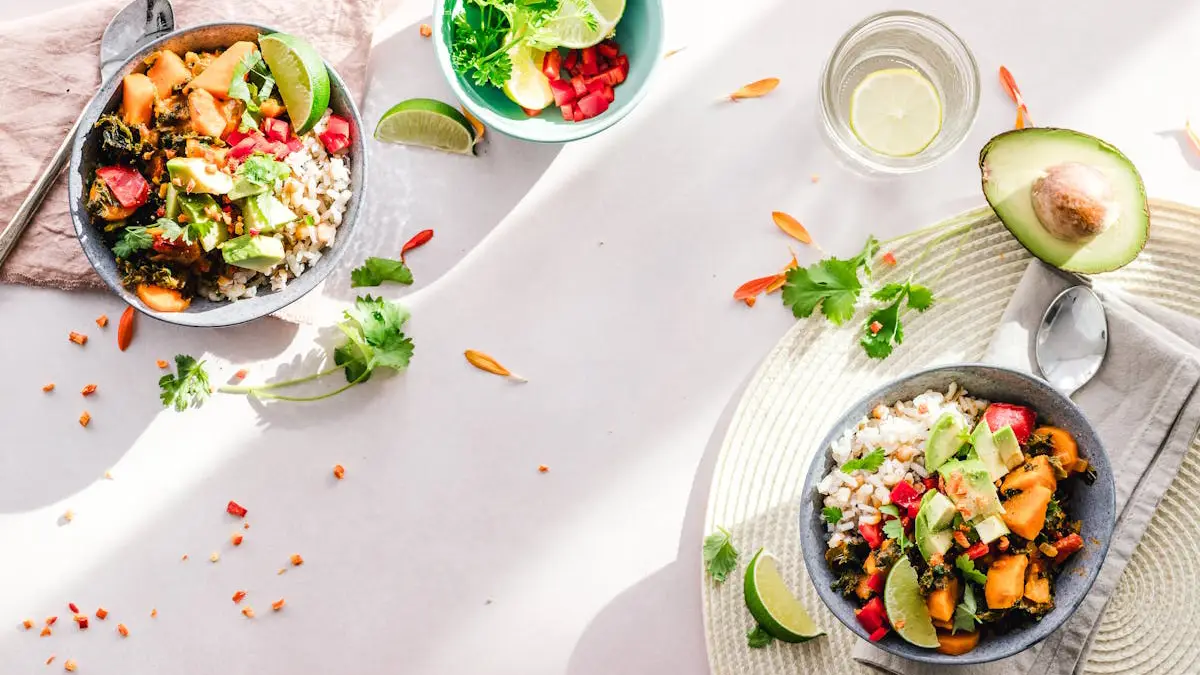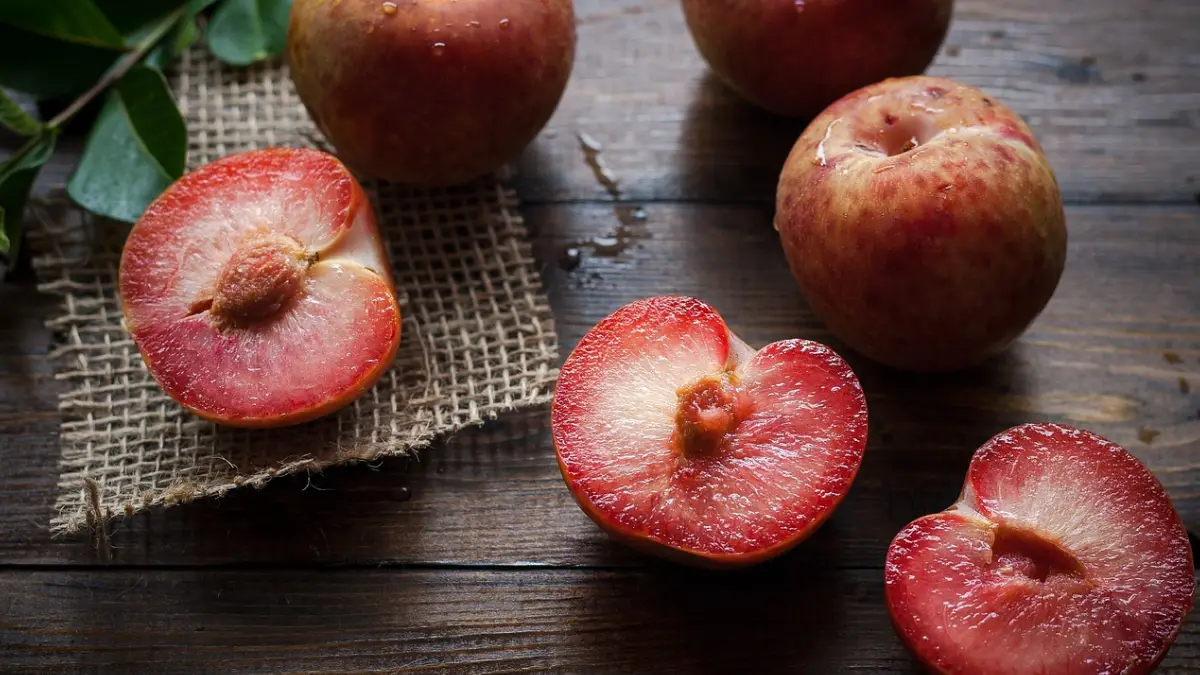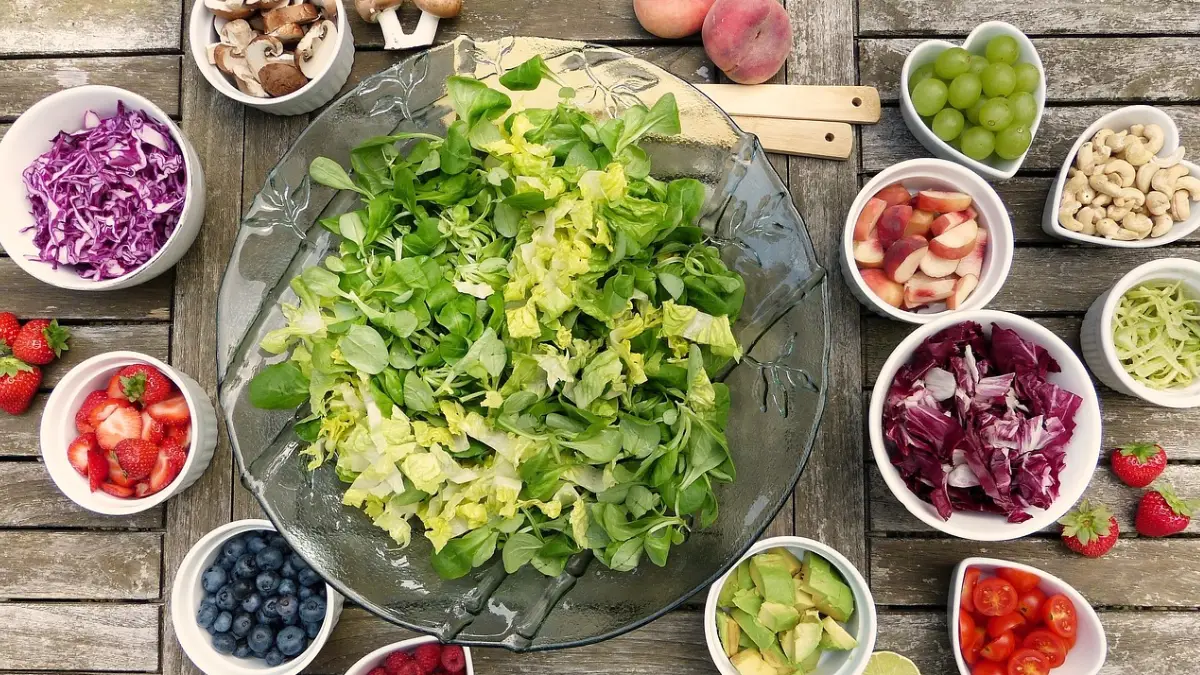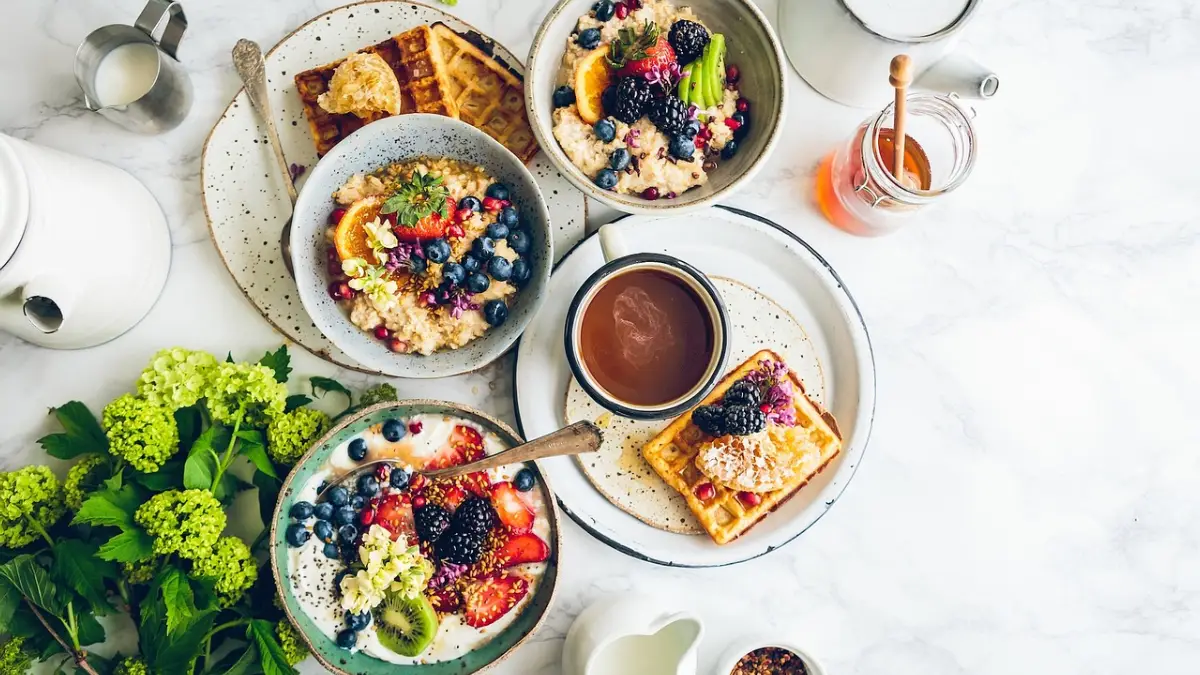
When it comes to maintaining energy for the whole day, what a person eats indeed matters. Balanced nutrition provides just the right kind of energy one needs for ordinary daily activities as well as provides long-term well-being and good health. Awareness of what a person’s body needs and knowledge of how one can maintain well-balanced intake of nutrients helps a lot with health improvement in general. This article will take you through ideal eating habits that can keep you energized and will focus on nutrition, meal timing, and the role of gut health in energy production.
1. The Importance of Balanced Meals
Maintain your energy levels by eating a balanced diet. The three best sources of sustained energy come from foods with carbohydrates, proteins, and healthy fats. While carbohydrates are made up of main whole grains, fruits, and vegetables, this is the number one source of energy for your body. However, proteins through lean meats, beans, and legumes work to maintain energy over time because healthy fats within avocados and nuts have the ability to preserve energy in the long term. Including a variety of these macronutrients will ensure that your body receives consistent fuel throughout the day.
2. Hydration: The Unsung Hero of Energy
Hydration is just as crucial as food. Even mild dehydration can cause one to feel drowsy, lose concentration, and feel slowed down. Staying hydrated allows fluid balance, which supports multiple body functions in transporting nutrients into your cells. Try to have at least 2 to 3 litres of water a day, and don’t forget about hydrating yourself with herbal teas or water-dense fruits such as cucumbers and melons.
3. The Role of Fibre in Energy and Digestion
Fibre is essential for both energy and gut health. It slows the digestion of food, providing a more gradual release of glucose into the bloodstream. This helps maintain steady energy levels and prevents the energy spikes and crashes that often follow sugary or processed foods. Eating fibre-rich foods, such as vegetables, fruits, and whole grains, also helps improve digestive health and can help to benefit gut health by promoting regular bowel movements and supporting beneficial gut bacteria.
4. Meal Timing for Maximum Energy
What and when you eat can impact how energetic you feel throughout the day. Starting the day with a balanced breakfast is important to kick start your metabolism and prevent energy dips later. Eating smaller, balanced meals or snacks every 3-4 hours can also help maintain steady energy levels, preventing the fatigue that can result from large, heavy meals or skipping meals altogether.
5. The Impact of Gut Health on Your Energy
A healthy gut is directly linked to your overall energy levels. The bacteria in your gut play a role in digesting food, absorbing nutrients, and producing certain vitamins. By supporting your gut health with a diet rich in fibre, fermented foods (like yogurt and kimchi), and prebiotics (found in foods like garlic and onions), you can help improve nutrient absorption and boost energy production. The more diverse and balanced your gut microbiome, the more efficiently your body can generate energy from food.
6. Avoiding Energy Drains: Processed Foods and Sugars
While it’s tempting to reach for quick fixes like sugary snacks or energy drinks, these can lead to crashes and leave you feeling more tired in the long run. Processed foods, which are often high in refined sugars and unhealthy fats, can contribute to blood sugar imbalances, leading to spikes in energy followed by rapid declines. Focusing on whole, unprocessed foods will give your body the consistent fuel it needs for optimal energy levels.
Conclusion
In conclusion, eating for energy involves more than just choosing the right foods; it’s about understanding how your body uses nutrients and how certain habits can optimise your vitality. By maintaining a balanced diet, staying hydrated, and supporting your gut health, you can improve energy production and sustain high energy levels throughout the day. Remember, what you eat doesn’t just fuel your body—it fuels your life. So, make mindful food choices that support your energy needs and overall health, and you’ll reap the benefits every day.

Fermented foods have long been a part of the human diet, and in recent years, there has been a greater awareness of their health benefits, particularly gut health. Fermentation is a process that introduces beneficial bacteria into the food we eat; these live microbes improve digestion, immune function, and overall health. We will investigate how these fermented foods can benefit gut health by including probiotic bacteria.
What Are Probiotics?
Probiotics are live bacteria and yeasts that, when ingested in proper levels, can benefit health. Probiotics, with their role as friendly microorganisms, are believed to facilitate the maintenance of the colonic microbiota – the colony of microorganisms existing within the digestive system – which would therefore enhance gut health. A healthy gut microbiome indicates adequate digestion, immunological function, and mental health.
Fermented Foods and Their Role in Gut Health
Fermentation is that process wherein microorganisms like bacteria and yeast take the sugar and transform it into alcohol or acids. In fermented food, it has been indicated that probiotics’ production is helpful to your gut flora. Few examples of these fermented foods include yoghurt, kefir, kimchi, and sauerkraut. These foods are abundant in beneficial bacteria.
Improving Digestion with Probiotics
Probiotics present in fermented foods are the key to a healthy gut. They break down food more effectively, which prevents bloating, gas, and constipation. Probiotics help maintain a good balance of bacteria in the gut for the proper digestion and absorption of nutrients so that the body gets the vitamins and minerals it needs.
Boosting Immune Function
A large portion of the body’s immune system resides in the gut, and probiotics are critical in helping with the development of immune functions. Fermented foods can help develop the lining of the gut and help stop harmful bacteria and toxins from entering your bloodstream. In doing so, probiotics enhance the ability of your body to protect against illness and infection.
Mental Health and the Gut-Brain Connection
A link between gut health and mental wellbeing is being researched, popularly known as the gut-brain connection. The presence of probiotics in fermented food can be useful in dealing with symptoms of anxiety and depression through enhanced neurotransmitter production, such as serotonin. An optimized gut microbiome may also have an optimistic effect on mood and cognition.
How to Incorporate Fermented Foods into Your Diet
It’s very easy to add fermented foods to daily meals; simply begin by adding small portions of yoghurt, kefir, or kombucha to meals and increase them accordingly. Some other foods such as sauerkraut and kimchi can be added to salads and sandwiches or can be part of a stir-fry. So many options are available to easily add these gut-friendly foods to your diet.
Conclusion
Fermented foods present a range of benefits, the most critical of which revolves around their ability to promote gut health, thanks to probiotics. They work to improve digestion and boost immunity while supporting mental health and are truly a great addition to any diet. Whether one is having yoghurt in a bowl or adding a little kimchi to their meals, making fermented foods a common part of your diet can have a significant positive influence on your overall well-being.

Arthritis is a common health condition in Australia, affecting millions of people. It is an acute musculoskeletal condition that affects the muscles, joints and bones. Apart from medications and physiotherapy sessions, you can improve your health and arthritis by focusing on healthy and nutritious food.
Managing healthy weight and keeping your gut health good is a key and food plays a major in it. A balanced diet rich in specific nutrients can significantly improve your quality of life. According to doctors in Melbourne, arthritis and diet goes hand by hand.
So, here is a complete guide to help you make right food choices and avoid junk and inflammatory options from your diet. Make a small yet impactful move towards healthy eating.
Food Options to Include in your Balanced Diet
1. Include Anti-Inflammatory Foods
It is good to add a plenty of fruits and vegetables, such as pineapple, berries, oranges, spinach and broccoli, which are rich in antioxidants. The best part is that it can help reduce inflammation.
You should also include omega-3 fatty acids such as salmon, sardines, and mackerel fishes, flaxseeds and walnuts, which can help decrease inflammation and reduce the risk of heart disease.
2. Cut Processed Foods and Sugars
Make sure you don’t consume processed foods, sugary snacks, and beverages, as they can contribute to inflammation. This may lead to weight gain, which can worsen arthritis symptoms.
Instead, follow the latest healthy food trends and include dates and the sweetness of fruits to keep your glucose level controlled.
3. Eat Whole Grains
It is good to add whole grains like brown rice, oats, quinoa and whole wheat bread in your diet. These options are healthy and high in fiber. You can prepare salads and other delicious recipes to help maintain a healthy weight and reduce inflammation.
4. Stay Hydrated
Doctors always recommend drinking plenty of water throughout the day to keep your joints hydrated. You should drink at least 3-4 litres of water every day. This will help remove toxins from your body.
It is good to set an alarm every hour so that you can drink a glass of water even in your busy schedule.
5. Choose Lean Protein
You should focus on eating healthy in the form of lean protein sources such as turkey, chicken, pulses, beans and legumes. It can help build and repair tissues and support muscle strength.
6. Incorporate Calcium and Vitamin D:
You should include dairy products, fortified plant-based milks, and leafy green vegetables to ensure you’re getting enough calcium and vitamin D, which are essential for bone health.
7. Use Herbs and Spices
Maintaining your arthritis means focus on eating food that can help reduce your inflammation and help achieve a healthy weight. Add flavor to your meals with herbs and spices like turmeric, ginger, garlic, and cinnamon, which have anti-inflammatory properties and can help manage arthritis symptoms.
You can also consult your dietician to know more information on healthy food and keep your health conditions controlled.
Conclusion:
By following these guidelines, you can create a nutritious meal plan that helps manage your arthritis symptoms and supports your overall health and well-being.

It is a well-known fact that eating healthy has plenty of benefits. Whether it is keeping common issues at bay or making your skin glow, healthy eating is the ideal way to stay fit and young for a long time. However, in the last few years, the popularity of fast food has increased a lot. More and more people are avoiding the essential micronutrients and macronutrients.
By now, you might be aware that what you eat and drink affects your body’s capability to handle infections. It also affects the likelihood of developing health problems as time progresses, which include obesity, diabetes, heart disease, and several types of cancer. The exact foods you will need depend on a variety of factors such as age and level of activity. But some tips apply to everyone. Here are the top tips for eating healthy.
1. Consume a variety of foods
It is worth noting that not all foods contain all the nutrients a human body needs. This is where incorporating a variety of them will be the ideal thing to do. Therefore, you should look to consume a mix of staple foods, including rice, wheat, and potatoes with legumes like beans and lentils. Include a variety of vegetables and fruits. Adding meat or eggs to your diet is also ideal if you are looking to hit that protein goal. Prefer wholegrain foods such as wheat and brown rice when you can as they are rich in valuable fibre, helping you feel full for an extended period.
2. Reduce Salt Consumption
It is considered too much salt might raise blood pressure, which is a major risk factor for heart stroke and disease. Even if you do not put extra salt in your foods, it is worth remembering that processed foods and drinks have them in higher amounts. So, that is why reducing the consumption of fast food is recommended. Next, when you are preparing your meals, use salt moderately and also reduce the use of condiments and salty sauces. Stay away from the snacks that are high in salt. Always read the labels of items and choose the ones that have lower sodium content.
Do not Consume Too Much Sugar
Nowadays, people have the habit of consuming way too much sugar than they should. Excessive sugar is bad for your teeth, and it also increases the risk of gaining unwanted weight. This can lead to some serious chronic health issues. Similar to salt, there is a lot of sugar in processed foods and drinks. So, firstly, stop consuming them on a frequent basis. Prefer eating fresh and nutrient-dense snacks instead of sugary foods. Also, reduce the consumption of ready-to-drink tea and coffee.
Limit Alcohol
There is no need to completely stop consuming alcohol. But if you have the habit of going overboard when drinking or drinking too often, it will be better to reduce the consumption. Drinking too much alcohol increases the risk of injury at that moment and also causes long-term health issues like cancer, liver damage, heart disease and mental illness. So, next time you are drinking, remember not to go overboard. If you want to stop drinking completely then that is fine as well.
Wrapping Up
Eating healthy is not a shortcut to achieving your short-term fitness goals. In fact, it is a long but worthy road to a healthier life. Consuming healthy foods is fairly straightforward if you can just pass the first few hurdles. By following the tips mentioned in this article, you will have an easier time staying healthy.

If you want to lose weight, feel good, be more energetic, and generally be healthier, you must maintain a balanced diet of healthy foods. Healthy foods have a variety of nutrients present in them, like carbohydrates, proteins, vitamins, fibres, fats and minerals. Healthy foods also help protect your body from oxidative stress that releases radical cells that grow and multiply and cause diseases like cancer and heart disease.
In Australia alone, over 27,500 preventable deaths have occurred due to unhealthy diets and eating habits. Therefore, health experts in Australia believe that you must include the following healthy foods in your diet to keep you strong and in good shape:
Top Healthy Foods To Include In Your Diet
-
Eat Berries To Get The Right Amount Of Fibre
According to studies, Australian women need 25g of fibre, and men need 30g daily. However, Aussies do not eat even half of this amount and thus put themselves at risk of heart disease, diabetes and cancer. Fibre is one of the most power-packed nutrients that
- Keep your heart healthy
- Provide you with vitamins and minerals
- Help you digest food properly
- Fill you up quickly
One of the best sources of fibre in your diet is any berry, whether it be strawberries, raspberries or blueberries. Here are the fibre content and health benefits of each of these berries:
- Strawberries have 3 grams of fibre and are packed with Vitamin C
- Blueberries have 4 grams of fibre and contain antioxidants
- Raspberries have 8 grams of fibre and cancer-fighting properties
-
Improve Your Bone Health With Chia Seeds
Another good source of fibre that also helps keep your bones in good shape is chia seeds. A bowl of these tiny seeds contains omega-3 fatty acids, minerals and antioxidants, and magnesium and calcium that keep your body strong and healthy. You can eat plain chia seeds or add them to milk to make a pudding.
-
Get Your Daily Dose Of Vitamin C With Broccoli
Broccoli is considered one of the world’s healthiest foods, as just ½ a cup of broccoli can give you around 80% of your daily recommended dose of Vitamin C. According to studies, an average adult in Australia needs 45 grams of Vitamin C daily, and broccoli contains around 65 grams of Vitamin C for every 100 grams.
Besides Vitamin C, broccoli also contains sulforaphane, which helps detoxify your body and fight cancer. It also contains Vitamin K, which helps blood clot properly in your body.
-
Keep Your Heart Healthy By Eating Salmon
Salmon is a healthy seafood option as it contains omega-3 fatty acids that are good for your heart and fight strokes. In Australia, stroke leads to around 5% of deaths, and coronary heart diseases cause about 6.9% of deaths. Thus, a healthy supply of salmon daily will help you keep your heart pumping and prevent heart disease. You should also eat salmon for its Vitamin D content as well as antioxidants that keep your skin glowing.
-
Enhance Your Eyesight By Consuming Eggs
If you want to improve your eyesight, health experts in Australia recommend that you include eggs in your daily diet. This is because egg yolks contain zeaxanthin and lutein antioxidants that protect your eyes from any damage. These antioxidants also prevent macular degeneration of your eyes, which causes blindness as you age. Eggs are also a good source of protein as they contain about 6 grams of protein and help protect your skin from the sun’s UV rays.
-
Reduce Inflammation In Your Body With Nuts
Last but not the least, nuts are a great source of antioxidants like ellagic acid that protect your body from wear and tear and reduce inflammation which can help prevent cancer.
Not only this, but nuts also maintain your heart health as they contain magnesium and polyunsaturated fats. These ingredients also help prevent insulin that causes diabetes. Lastly, nuts help feed the good gut bacteria in your stomach, which helps you digest food and keeps your digestive system healthy.
Conclusion
Health experts in Australia recommend that you include the above health foods in your daily diet to get the required nutrients and protect yourself from harmful diseases. It is important to maintain a balanced diet of these healthy foods per your dietary requirements to stay fit and active.

According to reports, Australia is facing high food inflation, with rates rising from 2% during the COVID-19 pandemic to 7.8% in December 2022. These rising rates are expected to continue through 2023, and thus consumers and families are making smarter choices when buying groceries and eating out. Besides smarter food choices, Australians are also venturing towards more environmentally sustainable food options, reducing waste as well as more health-based foods. Here are some of these top healthy food trends for 2023 given by health experts in Australia:
Top Health Food Trends Of 2023
-
Eating More Meals At Home
Since the cost of meals in restaurants and takeaways rose by 7.3% in December 2023, consumers are opting to eat more meals at home. People are also making smarter food choices by buying only the groceries they need, planning meals ahead and buying more affordable options. For instance, Australians are buying more tinned fish in place of more expensive meat cuts.
-
Improved Efforts At Reducing Food Wastage
Did you know that Australia wastes 7.6 million tonnes of food every year, which costs the economy around 36.6 billion dollars? This massive food wastage also causes around 3% of Australia’s global greenhouse gas emissions. The Australian government has already started initiatives like Stop Food Waste Australia and the Australian Food Pact voluntary agreement to reduce food wastage by 50% by 2030. These initiatives also include upcycling unsaleable produce into food ingredients, plant protein powders and material for composting to stop food from ending up in landfills.
-
Increased Focus On Plant-Based Food Products
Even though meat plays a significant role in the Aussie diet, more than 27% of people are now opting for more plant-based food options. Plant-based meat like burgers and sausages is fast becoming a natural and healthy alternative to red meat in Australian households.
There are also now plant-based seafood options like vegan sushi that have just entered the market but are already creating quite an impact. This trend will continue in 2023, with more plant-based options for dairy and egg products as well.
-
Consuming Healthy Lab-Grown Meat
Currently in the developing stage, cultured meat can soon be launched in the market, with many countries, including Australia testing this trend. Biotechnology and tissue engineering processes extract cells from animals and produce meat products as cultured meat or cell-based meat. This is a healthier option as you do not have to kill the animals for the meat product, and you can also reduce the emission of methane gas as you do not have to graze the animals. This cell-based meat will:
- Help climate change
- Reduce chemicals in meat
- Stop the killing of animals
-
Growth Of Food Products That Boost Your Mood
Lastly, according to health experts in Australia, there is a growing trend of food products that improve brain functioning and your mood in 2023. People are more interested in purchasing and eating foods that not only improve their health and provide them with all the nutrients but also food items that make them happy and fight depression and anxiety.
For instance, there has been an increase in demand for omega-3 fatty acids as they help improve mood swings and boost feel-good hormones in your body. There has also been a rising demand for food products that contain zinc, magnesium, caffeine and vitamins that:
- Increase the functioning of your brain
- Reduce the risk of dementia
Another rising trend is the demand for natural nootropics like ginkgo biloba, lion’s mane mushroom, ginseng and L-theanine in your green tea. These products improve cognitive functions in your body and mind.
Conclusion
Thus as seen above, the main healthy food trends in 2023 will place emphasis on more plant-based food options, including plant-based meat like burgers and sausages. There will also be an increased emphasis on reducing food wastage as well as unnecessary expenses on eating out and groceries. You will also find more mood-uplifting foods in the market that will help fight depression and dementia. But the most significant trend could be the rise of cell-based meat, which will stop animal killing. However, this trend is still in its testing stages and needs to undergo several trials before being launched in Australia.
